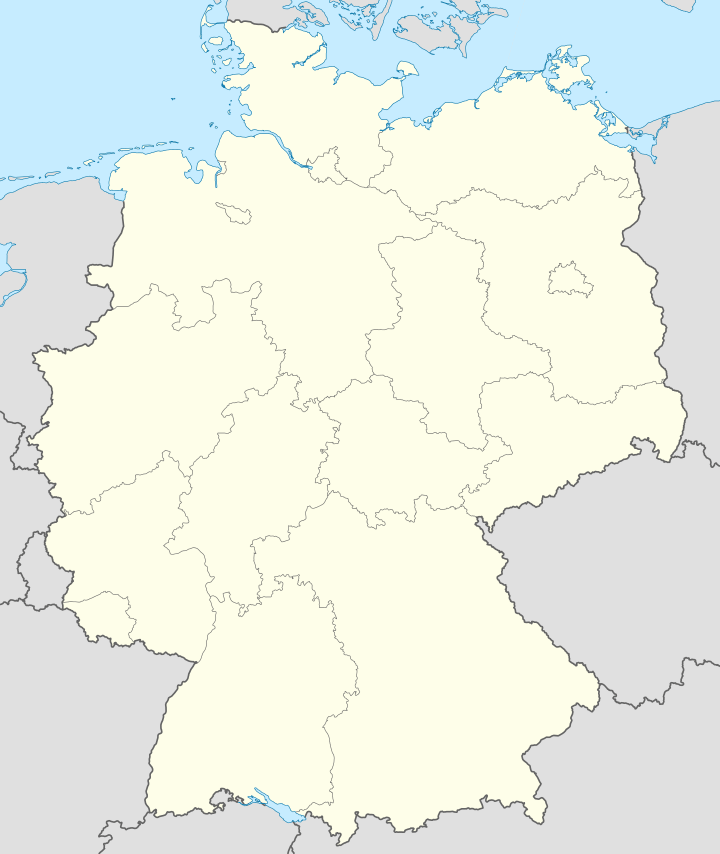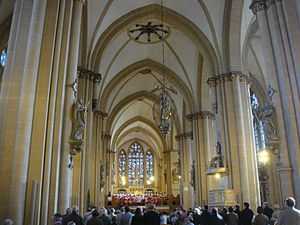Paderborn Cathedral
| Paderborn Cathedral | |
|---|---|
| The Cahedral of Saint Mary, Saint Kilian and Saint Liborius | |
| Paderborner Dom | |
|
Paderborn Cathedral | |
 Paderborn Cathedral | |
| 51°43′08″N 8°45′19″E / 51.71889°N 8.75528°E | |
| Location | Paderborn |
| Country | Germany |
| Denomination | Roman Catholic |
| History | |
| Founded | 13th century |
| Architecture | |
| Status | Active |
| Functional status | Cathedral |
| Style | Romanesque-Gothic |
| Specifications | |
| Length | 104 m (341 ft 2 in) |
| Width | 52 m (170 ft 7 in) |
| Height | 28 m (91 ft 10 in) |
| Number of spires | 1 |
| Spire height | 93 m (305 ft 1 in) |
| Administration | |
| Archdiocese | Archdiocese of Paderborn |
| Clergy | |
| Archbishop | Hans-Josef Becker |

Paderborn Cathedral (German: Paderborner Dom) is the cathedral of the Catholic Archdiocese of Paderborn. It is located in the city centre of Paderborn, North Rhine-Westphalia, Germany. The cathedral is dedicated to Saint Mary, Saint Kilian and Saint Liborius. The official German name is "Hoher Dom Ss. Maria, Liborius und Kilian".
Architecture and history
The building is a hall church (i.e. with three aisles all reaching to the height of the roof) in a transitional Romanesque-Gothic style. The cathedral is mainly of the 13th century. The western tower of the 12th century is 93 m high. The relics of Saint Liborius are kept in the crypt, which is with a length of 32 m one of Germany's largest crypts.[1]
External dimensions
- Length: 104 m
- Width: 52 m
- Height: 28 m
- Height of the tower: 93 m
Points of especial interest
- Paradise Portal (before 1240)
- Pietà (around 1380)
- Gothic high altar (late 15th century)
- Double Madonna (around 1480)
- Tomb of Prince-Bishop Dietrich IV von Fürstenberg (d. 1618)
- Pulpit in Régence style (1736)
Window of Three Hares (Dreihasenfenster)

One of the cathedral's, and the city's, most recognisable features is the Dreihasenfenster ("Window of Three Hares"). It depicts three hares in motion, arranged in a triangle. Each hare is shown as having two ears, although only three ears are visible in total. The original 16th century carving can be found in the cloister's inner courtyard, and has been duplicated on numerous buildings and a number of shops throughout the city centre.
Burials
Notes
- ↑ The relics of Liborius were translated with great ceremony to Paderborn from Le Mans, of which Liborius had been bishop, in 836 during the reign of Emperor Louis the Pious. To commemorate this event the nine-day-long Libori fair is still celebrated in Paderborn every year.
Sources
- Virtual tour of Paderborn Cathedral (German)
- Paderborn City website: Cathedral (German)
- Paderborn City website: Eine „Hasengeschichte“ [Story of the Hares ] (PDF; 213 kB) (German)
- Photos of the cathedral 2009
- Church service regulation (German)
Further reading
- Bauer, Heinz, and Hohmann, Friedrich Gerhard, 1987 (1968): Der Dom zu Paderborn. Bonifatius-Druckerei, Paderborn, 4th revised edition 1987, 1st edition 1968. ISBN 3-87088-529-7.
- Lobbedey, Uwe, 1984: Der Dom zu Paderborn (Westfälische Kunststätten, Heft 33). Bonifatius-Druckerei, Paderborn 1984. ISBN 3-87088-423-1.
- Lobbedey, Uwe, 1990: Der Paderborner Dom (Westfälische Kunst). München/Berlin 1990
- Niggemeyer, Margarete, 1996: Bilder und Botschaften – Der Dom zu Paderborn als Sehschule des Glaubens. Paderborn: Bonifatius-Druckerei. ISBN 3-87088-881-4.
External links
| Wikimedia Commons has media related to Paderborner Dom. |
